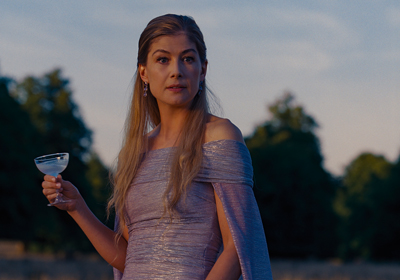
"visually supports the story by focusing on minuscule details, gifting her film a mysterious glow and baroque aesthetic"
The Opening feature for the London Film Festival, Saltburn is a twisted, satirical and thrilling reflection on modern society through the eyes of a young generation.
Everyone at some point in their life has been the shy and introverted student at Uni, who would like to be friends with the popular group, but is not interesting enough to be included. If that is not your reality, then you were the popular kid everyone wanted to be friends with.
In Saltburn Emerald Fennell gives the audience a closer twisted look to every young adult’s reality by exaggerating it, or simply by showcasing the intrusive obsessive thoughts someone may experience while being introduced to a new life in a new school, no matter how prestigious.
The camera follows Oliver Quick and his arrival at Oxford. It is immediately clear that he is not popular and other students avoid his company. Reluctantly the math nerd ends up being his only friend while he observes the popular kids hanging together at school or in the pub.
Among them, the most popular of them all, Felix. Good looking, loud, friendly and always surrounded by people. Oliver immediately starts to gravitate towards him from a distance, wondering how it must feel to be just like Felix.
Until, by chance, Oliver ends up helping him with his broken bike.
The two become fast friends, with Felix being fascinated by Oliver’s difficult and dark upbringing and Oliver just loving the idea of belonging.
When summer rolls around Felix invites Oliver to his opulent family estate, where he meets Felix’s eccentric family and things rapidly take a turn for the worse.
What I love about Emerald Fennell's style is that, nothing is what it seems to be on the surface.
As a screenwriter she plays the long game, leaving clues and details scattered around the movie, which complete the puzzle at the end of this story. All of this is then accompanied by a pungent sense of humour and perfect comedy timing that gives a steady rhythm to the film.
As a director, she visually supports the story by focusing on minuscule details, gifting her film a mysterious glow and baroque aesthetic.
This is her signature style, her personal imprint that makes the story captivating and traps the audience in a sense of comfort only to pull the rug from under their feet at the very end.
All of this magic can only be achieved by a cast that is not scared to bare it all on screen, no matter how weird or disturbing the request is to make the story pop.
Barry Keoghan is a chameleon and embodies Oliver with such ease. He is one of those actors who become their character and doesn’t shy away from portraying on screen even the most sadistic or dark instinct. As a performer he bares it all in Saltburn and carries the movie on his shoulders.
To compliment Keoghan’s performance, Saltburn has among its ranks the best Hollywood has to offer; of course Rosamund Pike, Jacob Elordi and Richard E. Grant are the ones who stand out and hold their own when sharing the screen with Keoghan. All their performances are unique and marry perfectly with the tone of the story.
Slightly hidden within the lines, delivered with incredible poignancy, lies the subtle critic to modern society. The separation between rich and poor and how first impressions can always be tragically misleading are ever present throughout the story.
Saltburn can easily be mistaken for a movie about obsession, but in reality, similar to her most recent project “PROMISING YOUNG WOMAN”, this film is a story about revenge, about desiring something with such a burn that nothing will stand in the way. This time it is not dignity or justice that the main character seeks, but more the need to prevail over those people that always had everything easy in life.


No Comment